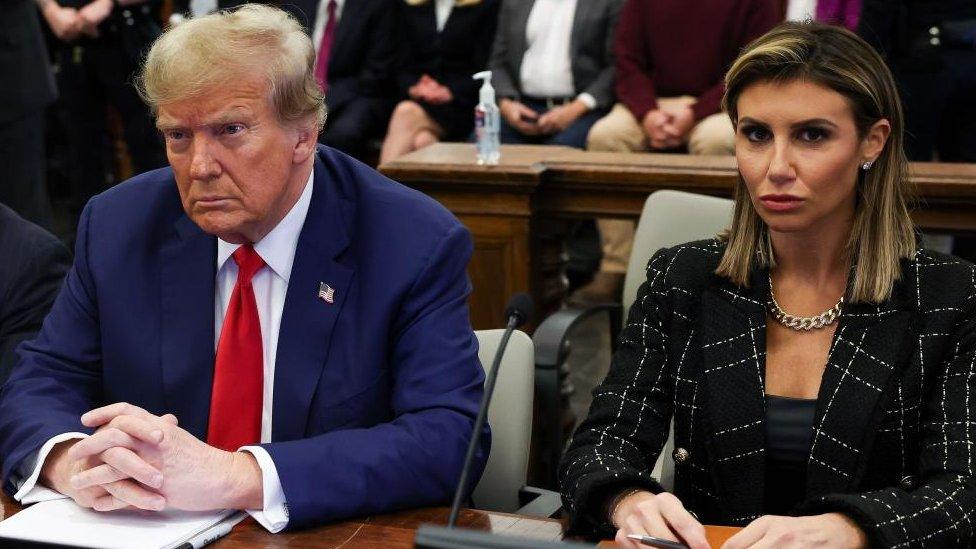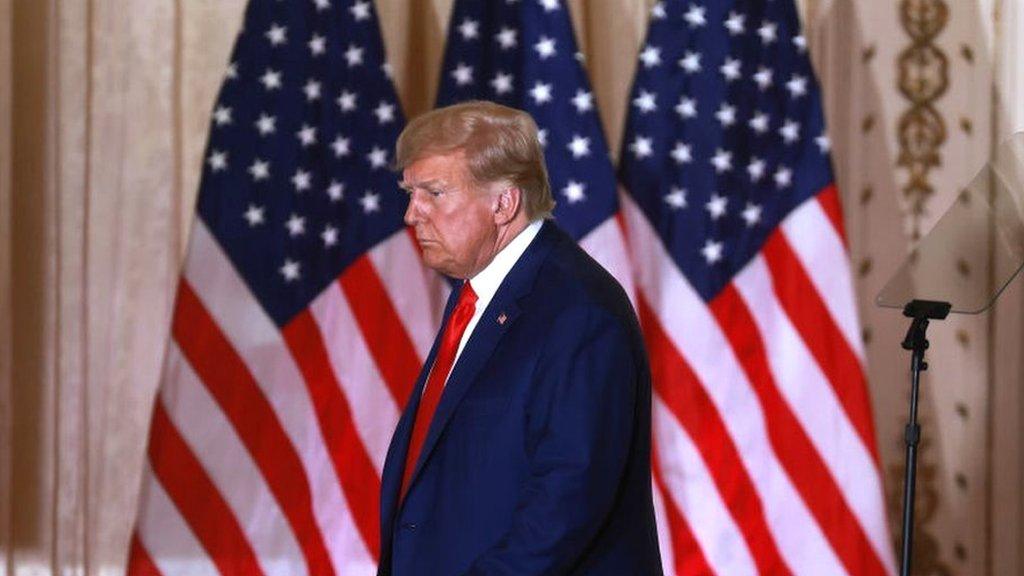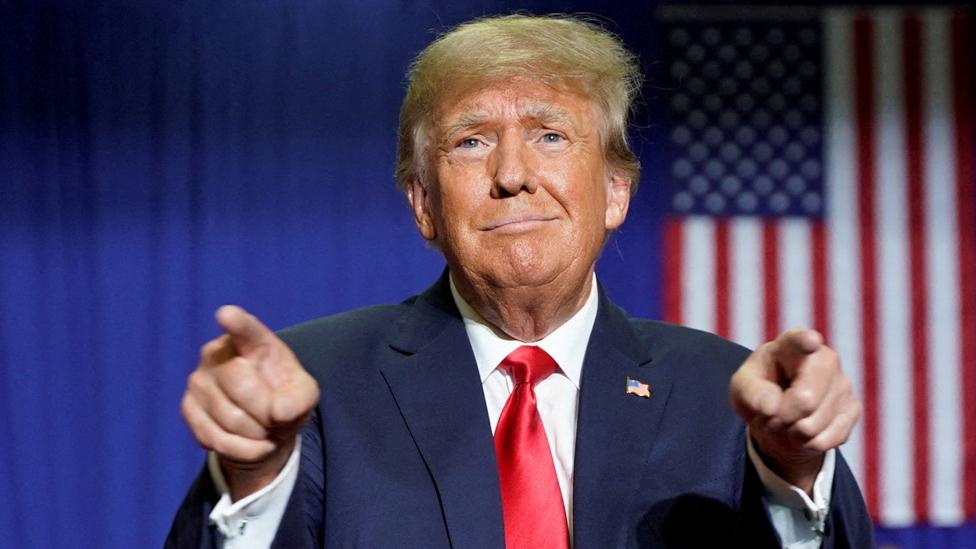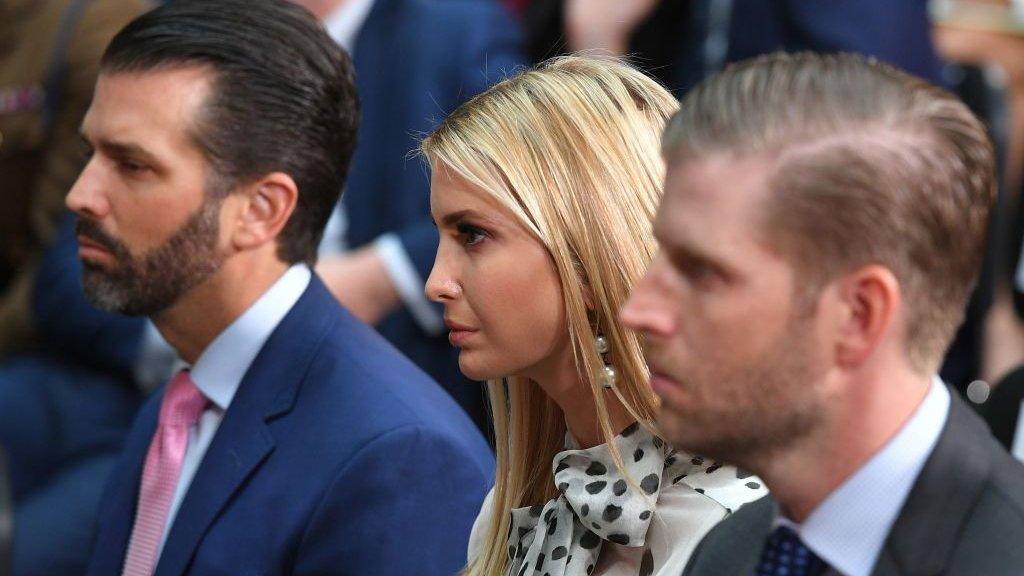A guide to Donald Trump's four criminal cases
- Published

Republican Donald Trump is facing off against Democratic presidential candidate and current Vice-President Kamala Harris in November's election. How might his criminal prosecutions affect his campaign?
The 78-year-old is the first former president in US history to be criminally convicted, having been found guilty of falsifying business records.
A few weeks later, the US Supreme Court ruled he had partial immunity in perhaps the most serious case he faces - that he tried to overturn the 2020 election result.
And it was not long before the former president scored a further legal win, when a Florida judge dismissed a case related to his handling of classified documents.
So what might happen next in his four criminal cases and what is at stake as he seeks to return to the White House?


What's it about?
Whether Trump illegally conspired to overturn his 2020 election defeat to Joe Biden.
Federal prosecutors allege he pressured officials to reverse the results, knowingly spread lies about election fraud and sought to exploit the Capitol riot on 6 January 2021 to delay the certification of Mr Biden's victory and stay in power.
He's been charged with four criminal counts, including conspiracy to defraud the US and conspiracy against the rights of citizens.
Some had speculated he would be charged with insurrection, or aiding insurrection, but that is not one of the charges.
US prosecutors in August issued revised charges in an attempt to navigate a ruling from the Supreme Court that had thrown the case into doubt.
That Supreme Court ruling had said that presidents have broad immunity from criminal prosecution for official acts they undertake.
The revised indictment leaves in place the four criminal counts, but these now relate to the former president's status as a political candidate rather than a sitting president.
It argues Trump acted as a private citizen and not as a president when he undertook the alleged scheme to sway the election.
Trump has denied wrongdoing and claimed the Biden administration is behind the prosecution. He previously pled not guilty to all charges.
Watch the moment Trump supporters stormed the US Capitol building
When's the trial?
It doesn't look like it will happen any time soon.
Trump launched an appeal in this case, claiming he had broad immunity from prosecution as president, due to a 1982 precedent that recognised immunity in civil cases.
Lower courts rejected Trump's claim but the Supreme Court ruled that Trump had limited immunity for official acts he carried out as president.
But the revised indictment shows that Department of Justice (DoJ) Special Counsel Jack Smith interprets the Supreme Court ruling to mean his case can still move forward.
Mr Smith's office said the superseding indictment had been presented to a new grand jury that had not previously heard evidence in the case.
But whether it would satisfy the Supreme Court's presidential immunity framework remains unclear.
There is a strong chance some of the charges may not survive.
If Trump wins re-election, he could in theory pardon himself or order all these charges to be dismissed.
Could Trump go to prison?
Penalties for the charges include:
Conspiracy to defraud the US is punishable by a fine or up to five years in prison
Obstructing an official proceeding is punishable by a fine or up to 20 years in prison
Conspiracy against rights is punishable by a fine or not more than 10 years in prison, or both
But there are logistical, security and political questions around whether Trump would actually serve time in jail even if convicted.
A conviction at trial would take the US into uncharted territory.


What's it about?
A payment made to the adult-film actress Stormy Daniels shortly before the 2016 election.
Ms Daniels was paid $130,000 (£103,000) to keep quiet about her claim that she had sex with Trump, which he denies.
Providing so-called hush-money is not illegal.
Instead, this case was more technical and centred on how Trump's former lawyer, who paid Ms Daniels, had his reimbursement recorded as legal fees in Trump's accounts.
What happened at trial?
The prosecution's key witness was ex-lawyer Michael Cohen, who testified that his former boss knew about the elaborate scheme to disguise the payment.
In days of heated cross-examination, Trump's lawyers sought to undermine Cohen and paint him as an unreliable witness and convicted liar.
The jurors deliberated over two days before finding the former president guilty of all 34 counts of fraud under campaign finance laws.
Trump has said the case is politically motivated.
His lawyers are requesting the conviction be overturned, citing the Supreme Court immunity ruling, according to a letter seen by US media including the BBC's partner network, CBS News.
Could Trump go to prison?
Each of the charges carries a maximum of four years in prison, although a judge could sentence Trump to probation later this month.
Legal experts told the BBC they think it is unlikely Trump will be jailed and that a fine is the more likely outcome.


What's it about?
Trump and some 18 other defendants are accused of criminally conspiring to overturn his very narrow defeat in the state of Georgia in the 2020 election.
The racketeering investigation, led by Georgia prosecutor Fani Willis, was sparked in part by a leaked phone call in which the former president asked the state's top election official to "find 11,780 votes".
Trump was hit with 13 criminal counts, subsequently reduced to 10. They include one alleged violation of Georgia's Racketeering Influenced and Corrupt Organizations Act (Rico).
The former president has pleaded not guilty.
When's the trial?
A date has not been set. The timeline has been complicated by an effort by Trump and his allies to disqualify Ms Willis because of her romantic relationship with a man she hired to work on the case.
An appeals court has tentatively set a date of 4 October to hear oral arguments in the bid to have Ms Willis removed.
Could Trump go to prison?
The racketeering charge carries a maximum 20-year jail sentence.
Georgia prosecutors would need to prove that there was a pattern of corruption from Trump and his co-defendants aimed at overturning the election result in order to bring a conviction.
As for making false statements, that carries a penalty of between one to five years in prison or a fine.


What's it about?
Whether Trump mishandled classified documents by taking them from the White House to his Mar-a-Lago residence after he left office.
The case against Trump is also about whether he obstructed the FBI's efforts to retrieve the files, as well as the criminal investigation into his handling of them.
The majority of the counts are for the wilful retention of national defence information, which falls under the Espionage Act.
There are then eight individual counts, which include conspiracy to obstruct justice, withholding a document or record and making false statements. Trump has pleaded not guilty on all counts.
When's the trial?
The case was dismissed by a Florida judge on 15 July, marking a significant legal victory for Trump just days after he survived an assassination attempt in Pennsylvania.
Judge Aileen Cannon, a Trump appointee, made the dismissal on the basis that the Justice Department's appointment of special prosecutor Jack Smith violated the US Constitution.
But Mr Smith appealedthe decision, which came after Judge Cannon cancelled the 20 May trial date without giving a new one.
Mr Smith argued the judge's view "deviated" from legal precedent.
Trump and his lawyers have long tried to put the case off until after the November presidential election.
The case now faces an uncertain future after the Supreme Court's immunity decision.
Could Trump go to prison?
If the case is restarted, these charges could, in theory, lead to substantial prison time if Trump is convicted.
Looking at the letter of the law, the counts under the Espionage Act each carry a maximum sentence of 10 years. Other counts, related to conspiracy and withholding or concealing documents, each carry maximum sentences of 20 years.
But the logistics of jailing a former president mean a conventional prison sentence is seen as unlikely by many experts.


North America correspondent Anthony Zurcher makes sense of the race for the White House in his weekly US Election Unspun newsletter. Readers in the UK can sign up here. Those outside the UK can sign up here., external

Related topics
- Published9 December 2024

- Published9 June 2023

- Published18 November 2022
- Published4 October 2022

- Published22 September 2022
